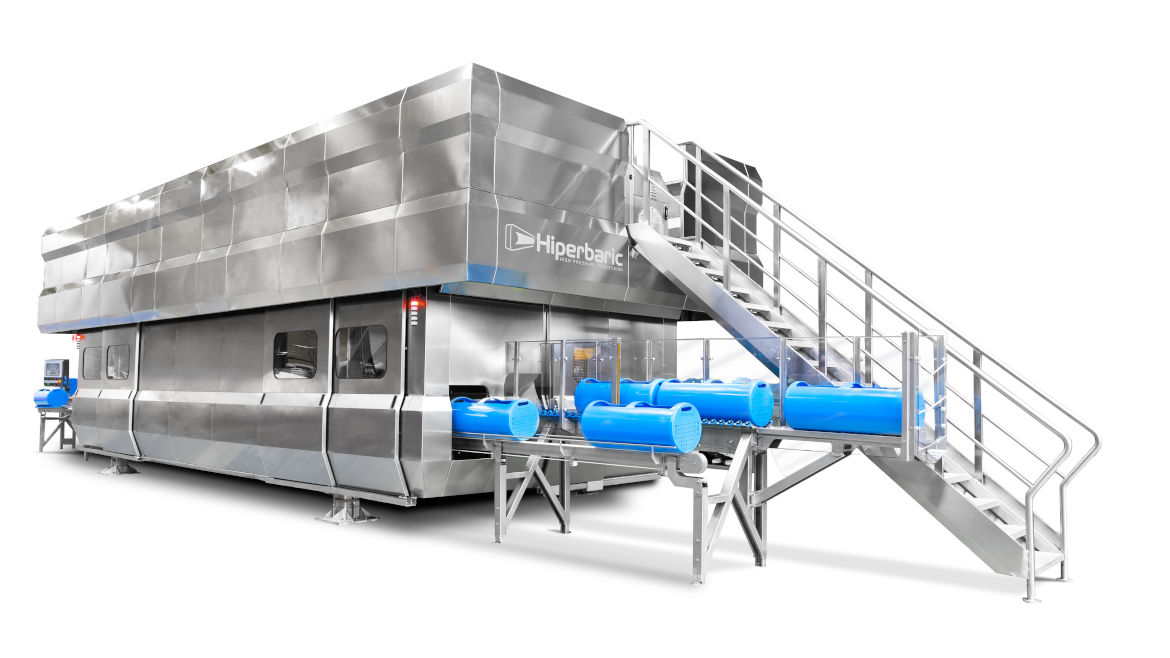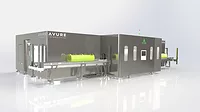High-pressure processing ensures product safety, extended shelf life for beverages
Beverage-makers utilize HPP technology for functional, clean-label products

Image courtesy of Universal Pure
Audiences have proclaimed Lizzo’s 2019 song “Juice” as a self-love and self-esteem anthem. “It ain’t my fault that I’m out here makin’ news / I’m the pudding in the proof / Gotta blame it on my juice,” she sings.
In her song, the term “juice” is synonymous with respect or power. In the beverage world, consumers are enjoying their juice but with a premium and cold-pressed twist.
Anthony Zapata, business development manager at Hiperbaric USA, Miami, says that consumer demand for premium, cold-pressed, organic juices continues to be strong, leading to the rise of high-pressure processing (HPP) technology.
“Juices and beverages make up about 24% of the food and beverages processed with Hiperbaric HPP equipment,” he observes. “Aside from cold-pressed juices, other beverage trends include the development of functional beverages and premium, craft beverages, such as fruit-infused waters and cold-pressed juice mixers for specialty cocktails.
Jenny Tuggle, marketing director at Lincoln, Neb.-based Universal Pure, also points to functional beverages and the increase in consumers who pay attention to ingredient labels.
“They are looking for fresh beverage products with clean labels — less additives and more nutrients,” she says. “More than that, consumers are seeking out beverages with benefits — functional beverages that offer more than just cleaner labels — they want to drink for their health. Functional beverages can support digestion, immunity, energy and more.”
Such cold-pressed, premium beverages work well with HPP because of the non-thermal method, Tuggle explains, which preserves without damaging the nutritional properties of the product.

“HPP technology ensures these benefits are retained while also guaranteeing safety and extended shelf life, meeting the stringent demands of health-conscious consumers,” she adds.
Like Zapata, Tuggle says beverages that work best with HPP technology include premium, cold-pressed juices, as well as functional beverages and shots. Other beverages that can take advantage of the technology are coconut waters, cold brew coffee, probiotic beverages and other specialty drinks, such as non-dairy milk products, Tuggle shares.
Hiperbaric’s Zapata states that the application of HPP technology has brought about “significant transformation” in the beverage manufacturing industry. He says that several beverages can benefit from HPP — aside from cold-pressed juices and shots — such as smoothies, fruit-based waters, functional sport and energy drinks, non-dairy milks, cold brew coffees and teas.
“As the market trends toward functional beverages for their added supplements, vitamins and probiotics, this category is specially positioned to benefit from HPP, as it extends shelf life while maintaining the flavor, color and heat-sensitive nutrients such as vitamins and enzymes,” Zapata explains.
The technology also can benefit beverage manufacturers. Zapata suspects HPP is gaining popularity in the industry thanks to its ability to meet multiple market demands.
As the market trends toward functional beverages for their added supplements, vitamins and probiotics, this category is specially positioned to benefit from HPP, as it extends shelf life while maintaining the flavor, color and heat-sensitive nutrients such as vitamins and enzymes.
“It satisfies consumer preferences for fresh, natural products with minimal processing and clean labels, while simultaneously extending shelf life without the need for preservatives or heat treatment,” he explains. “This technology also helps reduce food waste by allowing manufacturers to process fruits and vegetables that might otherwise be discarded. As a result, HPP provides beverage companies with a competitive edge, enabling them to offer healthier, less processed drinks that align with current consumer trends and logistical needs.”
All in all, Zapata says, the natural, fresh and safe attributes of HPP are driving adoption to meet consumer demand for healthier, less processed beverages with an extended shelf life.
Christian Calix, vice president of quality at Universal Pure, states that HPP remains a cornerstone technology for beverage-makers looking to enhance food safety and quality.
“HPP effectively eliminates harmful bacteria like listeria, salmonella and E.coli, ensuring compliance with stringent food safety regulations,” he explains. “This method extends shelf life significantly by up to several weeks or even months, depending on the product.”
Universal Pure’s Tuggle adds that extended shelf life enables further geographical distribution, reducing waste and increasing the window of time for the product to be marketed and sold.
“It truly is a win-win for beverage manufacturers, especially those need to extend shelf life to get their products into the retail market,” Tuggle says.
Calix notes that HPP is recognized by the FDA as a suitable method for achieving pathogen reduction in foods and beverages.
“As regulatory frameworks evolve to support safer food production practices, HPP will continue to be a preferred method for ensuring microbiological safety while preserving the sensory and nutritional qualities that consumers value,” Calix says.
Making moves with HPP
Although HPP technology still has potential to expand its reach, a plethora of advancements have been added to the technology.
Hiperbaric’s Zapata notes that automation has been a major advancement.
“Evolution Fresh, a Bolthouse Farms subsidiary, uses Hiperbaric automation equipment to HPP its cold-pressed juices,” he shares. “The company reports the following benefits, including 15% improvement in overall equipment effectiveness, 90% reduction in injuries, 50% reduction in transportation waste and 50% reduction in line labor.”
Aside from automation, Zapata notes that Hiperbaric recently partnered with Petainer, a company providing one-way PET recyclable kegs that can take advantage of HPP technology.
“This allows juice manufacturers to dispense juice on tap at grocery stores, festivals, trade shows and other events,” he explains. “Companies like Green Plant of Miami and Nourish Cold Pressed Juice of Kennett Square, Pa., are providing juice in this format.”
Universal Pure’s Tuggle expresses that HPP itself has not needed much improvement in the past 10 years, but minor adjustments to machine design, layout and complimentary equipment.
“HPP product applications continue to expand, which you could say is an advancement to the technology,” she says. “The real advancement is through product research and development — more extensive testing and product formulation allow for new HPP applications.”
For example, Tuggle notes that recently, some emerging cold brew coffee brands are using HPP to extend shelf life and overall provide a higher quality, fresh cold brew product.
In terms of the future of HPP, Tuggle says that it continues to be the go-to food safety method for fresh, premium beverage products.
“This trend will only continue as consumers remain focused on health and wellness,” she states. “HPP bridges the gap between beverage manufacturers with fresh beverage product and the consumers demanding them at the retail level. There must be a way to ensure product safety and shelf life, plus nutrition and quality, without adding preservatives — HPP solves them all.”
As technology and consumer demands evolve, Tuggle anticipates further innovations in HPP applications, potentially expanding into new beverage categories and enhancing the overall sustainability of the beverage industry.
Looking for a reprint of this article?
From high-res PDFs to custom plaques, order your copy today!






